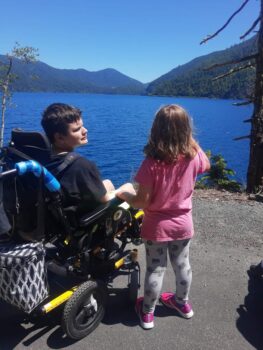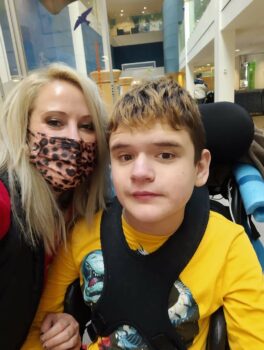 Stage was born three weeks premature and soon began having seizures. He was diagnosed with mitochondrial myopathy, a life-threatening diagnosis with no cure and which causes significant muscular and neurological problems.
Stage was born three weeks premature and soon began having seizures. He was diagnosed with mitochondrial myopathy, a life-threatening diagnosis with no cure and which causes significant muscular and neurological problems.
For Stage and his family, it meant unexpected, lifelong care.
“I was naïve enough to think that insurance covered everything if your kid was sick,” recalls Stage’s mom, Jessie. “It felt like so much to learn all about the ins and outs of health insurance while simultaneously trying to learn how to give my child a tube feeding or how to administer emergency seizure medicine.”
Bills from hospital visits, medications and ambulance rides began to pile up, and soon the family’s home was going into foreclosure.
“When you get into that situation, you just think the world stops; that everybody must surely understand what you’re going through and will be patient. But they don’t,” says Jessie.
At a loss for what else to do, Jessie made sure she had medication for Stage, and called Seattle Children’s.
“I told them ‘I need to cancel all of my son’s upcoming appointments, because my priority right now is to make sure he is going to have a home to live in.’”
Finding a sense of relief
Jessie’s phone call raised concerns with Stage’s clinical team because of the level of care needed for his medically complex diagnosis. They connected Jessie with a social worker, who helped them apply for uncompensated care.
“I assumed uncompensated care would be a challenging process. But the social worker pulled out this little trifold brochure, I answered the questions and within a few days got a letter back that said ‘Congratulations, your child has been accepted.’ After that, everything just got easier.”

It’s generous support from our community who help make this possible for families like Jessie and Stage’s. Last year, Seattle Children’s provided more than $280 million in uncompensated care— a record breaking amount.
“Without donors, we would not be able to provide financial assistance to our families and at the same time provide all the services that kids in our region need from us,” says Erin Merlino, Revenue Cycle Director at Seattle Children’s. “Donations to uncompensated care help individual families as well as the ability of our organization to serve the population we are dedicated to serving.”
For parents like Jessie, the relief of being able to focus on Stage’s care is priceless.
“I didn’t have to try and decide if Stage was having a life-threatening seizure or not. I could just take him to Children’s and not have to worry about making the wrong choice. Knowing I could take my child to get the care he needed, without that worry, was huge.”
Helping the whole family
It isn’t just Stage who has benefited from uncompensated care.
“When you have a medically complex kid, everything tends to be focused on them, and you try so hard to provide a normal childhood for their siblings because that takes its toll on the family,” Jessie says. “Removing that financial worry meant that I was able to sign my daughter up for Campfire Girls. She got to be in ballet.”
Another area where Stage’s family received support was through Seattle Children’s Guild Association, which is the largest all-volunteer fundraising network for any hospital in the nation.

As Stage got older and transitioned into a wheelchair, his family needed a car that could safely and easily accommodate his chair. That’s where the Mitochondrial Research Guild stepped in.
Founded in 2002 by a dedicated group of patient families, the guild works to raise awareness, promote research and improve the quality of care available to children and their families dealing with the potentially life-threatening effects of mitochondrial disease.
Thanks to their 2014 Family Grant Program, Jessie was able to purchase a van equipped with a wheelchair ramp to make it easier to bring Stage to his various appointments and activities.
Today, Stage is 16 years old and continues to receive care at Seattle Children’s.
Jessie has learned a lot about navigating the healthcare system and is now a family advisor at Seattle Children’s to help support other families experiencing medical and financial challenges.

